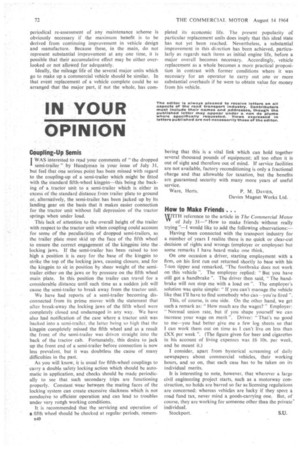IN YOUR OPINION
Page 74

If you've noticed an error in this article please click here to report it so we can fix it.
Coupling-Up Semis
I WAS interested to read your comments of "the dropped I
semi-trailer" by Handyman in your issue of July 31, but feel that one serious point has been missed with regard to the coupling-up of a semi-trailer which might be fitted with the standard fifth-wheel kingpin—this being the backing of a tractor unit to a semi-trailer which is either in excess of the standard distance from trailer plate to ground or, alternatively, the semi-trailer has been jacked up by its landing gear on the basis that it makes easier connection for the tractor unit without full depression of the tractor springs when under load.
This lack of attention to the overall height of the trailer • with respect to the tractor unit when coupling could account for some of the peculiarities of dropped semi-trailers, as the trailer plate must skid up the face of the fifth wheel to ensure the correct engagement of the kingpins into the locking jaws. If the semi-trailer has been raised to too high a position it is easy for the base of the kingpin to strike the top of the locking jaws, causing closure, and for the kingpin to sit in position by sheer weight of the semitrailer either on the jaws or by pressure on the fifth wheel main plate. In this position the trailer can travel for a considerable distance until such time as a sudden jolt will cause the semi-trailer to break away from the tractor unit.
We have had reports of a semi-trailer becoming disconnected from its prime Mover with the statement that after break-away the locking jaws of the fifth wheel were completely closed and undamaged in any way. We have also had notification of the case where a tractor unit was backed into a semi-trailer. the latter being so high that the kingpin completely missed the fifth wheel and as a result the front of the semi-trailer was driven straight into the back of the tractor cab. Fortunately, this desire to jack up the front end of a semi-trailer before connection is now less prevalent, but it was doubtless the cause of many difficulties in the past.
As you will know, it is usual for fifth-wheel couplings to carry a double safety locking action which should be automatic in application, and checks should be made periodically to see that such secondary trips are functioning properly. Constant wear between the mating faces of the locking system can create excessive slackness which is not conducive to efficient operation and can lead to troubles under very rongh working conditions.
It is recommended that the servicing and operation of a fifth wheel should be checked at regular periods, remem1340 bering that this is a vital link which can hold together several thousand pounds of equipment; all too often it is out of sight and therefore out of mind. If service facilities are not available, factory reconditioning is only a fractional charge and that allowable for taxation, but the benefits are guaranteed security with many more years of useful service.
Ware, Herts. P. M. Davms, Davies Magnet Works" Ltd.
How to Make Friends
WITH reference to the article in The Commercial Motor • " of July 31—" How to make friends without really trying "—I would like to ,add the following observations:— Having been connected with the transport industry for a number of years I realize there is no quick or clear-cut decision of rights and wrongs (employer or employee) but some remarks I have heard make one think.
On one occasion a driver, starting employment with a firm, on his first run out returned shortly to base with his 7-ton tipper and remarked, "The footbrake does not work on this vehicle ". The employer replied: "But you have still got a handbrake ". The driver then said, "The handbrake will not stop me with a load on ". The employer's solution was quite simple: " If you can't manage the vehicle like that I'll have to find somebody who can you're fired ".
This, of course, is one side. On the other hand, we get such a remark as: "How much are the wages?" Employer: "Normal union rate, but if you shape yourself we can increase your wage on merit ". Driver: "That's no good to me—you had better give me a few log sheets so that I can work them out on time as I can't live on less than £XX per week ". (The figure given for beer and cigarettes in his account of living expenses was £6 10s. per week, and he meant it.) I consider, apart from hysterical screaming of daily newspapers about commercial vehicles, their working hours, and so on, that each case has to be taken on its individual merits.
It is interesting to note, however, that wherever a large civil engineering project starts, such as a motorway construction, no holds are barred so far as licensing regulations are concerned; whereas vehicles are lucky if they sport a road fund tax, never mind a goods-carrying one. But, of course, they are working for someone other than the private' Stockport. S.U.




















































































































